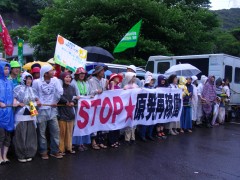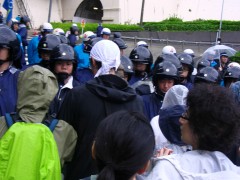05 August 2012
Japanese film "THERMAE ROMAE" meaning Roman Bath in Latin
Japanese actors playing Roman people in Hadrian era of Roman Empire.
One Roman architect of the bath time slipps to modern Japan and experience modern style bath.
All dialogues are done in Japanese except some short Latin dialogues.
Interesting thing was viewers could learn how Roman Empire functioned. How Roman viewed other parts of the world, and how slavery functioned. How important it was for the Emperor Hadrian to be deifeid after retirement.
One of the shocking thing shown was Emperor Hadrian had a boy lover and he was very much saddened by the boy's death. It was very openly depicted in the film maybe because it was Japanese film. In the West, such depicting would be very controversial.
The film was in fact, comedy. But it can be great textbook to learn Roman Empire stuff. Since it is made by Japanese from Japanese perspective, portrayal of Roman people looked very neutral. Not too religious and not too ideological. Hope the film will be released in Italy and other parts of the world.
21:48 Posted in Film, Italy, Japan News | Permalink | Comments (0) | Tags: history, gay
08 July 2012
Why we protest Restart of nuclear power plant
On July 1, 2012 one nuclear reactor, Ohi No.3 located in Ohi town in Fukui Prefecture was restarted. It was first time re-operation of nuclear power plant in Japan since 311 Fukushima nuclear crisis.
The government says it was to prevent blackout in case of energy shortage in heated summer. But the truth is to help electric power company from financial crisis. That is why so many people protesting the restart. More than 100 thousand people gathered in front of Prime Minister's House and Parliament building to shout "No Restart!" on the eve of restart.
In Ohi, local town of the nuclear plant, 7 hour bus ride from Tokyo, hundreds of people gathered at the entrace of the plant.

The problem is the plant had no safety measures to counter what happened in Fukushima. No wall to protect from tsunami, no filter ventilation, no earthquake resist building.
Even after a terrible disastor happened in Fukushima, there are people who want to forget about Fukushima and restart nuclear business.
In last two months, electricity was provided all over Japan without nuclear generation. That proves we never needed one. Japan has only relied 20-30% of energy on nuclear even before 311. It is easy to supplement that portion by other methods.
What we have to do is keep shouting protest against nuclear energy which is not only dangerous but cost-inefficient, harmful to the environment and human health even while regular operation. It consumes so much water and oil to dig and transport. Many got sick while digging uranium and maintenance. So much money is needed to operate including subsidies to local towns' poor budget in order to obtain approval for acceptance.
Stupid! We have to stop such stupidity.
14:33 Posted in Ecology, Japan News, Politics | Permalink | Comments (0) | Tags: nuclear power, fukushima
21 May 2012
Solar Eclipse seen in Tokyo
In the morning of May 21, Monday in Tokyo, from the balcony of my place, I saw beautiful solar eclipse. Of course I used sun glasses dedicated for this event.
I did enjoy it. Once solar shading started, the whole view from the balcony got darker and the temperature got colder.
After a few minutes, the sun became like golden ring from what I saw through the glasses.
Thank you, God. It was in fact the most beautiful show I saw in my life.
This show was actually seen not only in Japan but other parts of the world, California and Northern Texas.
The map and timetable is as follows.
http://latimesblogs.latimes.com/lanow/2012/05/solar-eclip...
|
Location |
Start Partial Eclipse |
Start Annular Eclipse |
Max Eclipse |
End Annular Eclipse |
End Partial Eclipse |
% of sun diameter covered |
|
Hong Kong (AM) |
5:08 |
6:06 |
6:08 |
6:10 |
7:16 |
94% |
|
Taipei (AM) |
5:07 |
6:10 |
6:10 |
6:11 |
7:23 |
94% |
|
Tokyo (AM) |
6:19 |
7:32 |
7:34 |
7:37 |
9:02 |
97% |
|
Crescent City, CA (PM) |
5:07 |
6:23 |
6:26 |
6:28 |
7:35 |
97% |
|
Albuquerque, N.M. |
6:29 |
7:33 |
7:35 |
7:38 |
8:36 |
97% |
|
Redding, CA |
5:11 |
6:26 |
6:28 |
6:30 |
7:36 |
96% |
|
Zion National Park |
6:23 |
7:31 |
7:34 |
7:36 |
8:37 |
96% |
|
Lubbock, Texas |
7:31 |
8:33 |
8:36 |
8:38 |
9:34 |
96% |
|
Lake Tahoe |
5:15 |
6:29 |
6:31 |
6:32 |
7:37 |
95% |
|
Chico |
5:13 |
6:28 |
6:30 |
6:31 |
7:37 |
95% |
|
Eureka |
5:09 |
6:25 |
6:27 |
6:29 |
7:36 |
95% |
|
Grand Canyon |
5:25 |
6:33 |
6:35 |
6:37 |
7:38 |
94% |
|
Yosemite Village |
5:18 |
|
6:33 |
|
7:39 |
92% |
|
Sacramento |
5:15 |
|
6:31 |
|
7:38 |
92% |
|
Las Vegas |
5:23 |
|
6:35 |
|
7:39 |
92% |
|
San Francisco |
5:15 |
|
6:32 |
|
7:39 |
90% |
|
Monterey |
5:18 |
|
6:34 |
|
7:41 |
88% |
|
Palm Springs |
5:26 |
|
6:38 |
|
7:42 |
86% |
|
Lancaster |
5:24 |
|
6:37 |
|
7:42 |
86% |
|
Downtown L.A. |
5:24 |
|
6:38 |
|
7:42 |
85% |
|
Malibu |
5:24 |
|
6:38 |
|
7:42 |
85% |
|
Griffith Observatory |
5:24 |
|
6:38 |
|
7:42 |
85% |
|
Burbank |
5:24 |
|
6:38 |
|
7:42 |
85% |
|
Woodland Hills |
5:24 |
|
6:38 |
|
7:42 |
85% |
|
Chatsworth |
5:24 |
|
6:37 |
|
7:42 |
85% |
|
Santa Monica |
5:24 |
|
6:38 |
|
7:42 |
85% |
|
Alhambra |
5:24 |
|
6:38 |
|
7:42 |
85% |
|
Arcadia |
5:24 |
|
6:38 |
|
7:42 |
85% |
|
Rowland Heights |
5:25 |
|
6:38 |
|
7:42 |
85% |
|
Ontario |
5:25 |
|
6:38 |
|
7:42 |
85% |
|
Anaheim |
5:25 |
|
6:38 |
|
7:42 |
85% |
|
Oxnard |
5:25 |
|
6:38 |
|
7:42 |
85% |
|
Long Beach |
5:25 |
|
6:38 |
|
7:42 |
84% |
|
Redondo Beach |
5:25 |
|
6:38 |
|
7:42 |
84% |
|
Palos Verdes |
5:25 |
|
6:38 |
|
7:42 |
84% |
|
Huntington Beach |
5:25 |
|
6:38 |
|
7:42 |
84% |
|
San Diego |
5:27 |
|
6:39 |
|
7:43 |
83% |
In fact, 18 years ago, when I was a college student in California, I tried to see it but it was a cloudy day so I couldn't see it.
Interesting thing is Japan has a legend of Sun Goddess. Japan is a nation of the Sun Goddess. That means I saw it in the nation of the Sun.
22:03 Posted in Japan News, Science, Tokyo Life | Permalink | Comments (0) | Tags: sun eclipse
06 February 2012
Documentary film"The Cove" Good for brain training
I rented a DVD of the film which contains Japanese subtitles and censored faces for the release in Japan. The film won US film Academy Award for documentary. It is about dolphin loving westerners trying to save dolphins in the cove in Taiji town in Wakayama Prefecture in Japan.
This documentary is interesting one in the sense that anyone can learn that documentary shouldn't be produced in neutral stance, in other words it can be propaganda or be very biased.
To me, it was like brain training material. The film is based on the producers' emotional matters. The story is mainly narrated by Rick O'berry, a former dolphin trainer for the famous TV show "Flipper." He felt guilty of using dolphins for entertainment. Since then he started activity to protect dolphins. He even had broken the law to do that. In this film he trespassed to capture dolphin hunting scenes.
I list up things agreeable and disagreeable matters in the film.
- Dolphins shouldn't be used for aquarium shows because they are put in stressful situation.
Agree, in that sense we should treat them better. Maybe animals shouldn't be used as toys or entertainment like bull fighting in Spain or Rodeo in US.
- Dolphins are as intelligent as human, so they shouldn't be killed and eaten.
Disagree. What is definition of "intelligence" they mean? Does that mean not intelligent creatures should be killed and eaten?
- Dolphin hunting is not Japanese culture but only local matter in the town. Most Japanese do not eat dolphin or whale meat. Cultural aspect can not be a reason for justifying dolphin hunting.
Disagree. Although dolphin hunting is only local culture in the town, it is their culture anyway. No foreigner or Japanese outside the town can interfere their activity. What they eat is their business. As long as the specie is not endangered, anyone can eat anything except human on the earth. I do not care Koreans eating dog meat though I don't and I think dogs are as intelligent as human.
The film featured some facts Japanese merely pay attention as follows.
- If people continue to fish in the oceans at current speed, the marine resource will all disappear in 40 years. Japan is the world's largest consumer of seafood.
- If you are arrested by the police, the police can detain you for 135 days until indictment is decided. If indicted, you are convicted at rate of 90%.
- Japan pays so much money to small nations to gain pro-whaling votes in IWC. Japan's intention is not economic one but very political, which is protesting western imperialism.
- IWC delegate from Japan says whaling is one way of pest control because they are eating smaller fish.
- Dolphins and whale meats sometimes contain very highly concentrated mercury inside and those are provided to school lunches for children. (Now we should be worried about radioactives.)
One thing I wondered was why Taiji town did not permit the documentary crews to videotape their hunting of dolphins, not letting them do that illegally. That way they can solve the problem. It is bloody and brutal but what is the problem? That is what humans do for survival. We do that to cows, pigs, birds and even to fruits and vegetables. Plants are living creatures. Even vegetarians cannot avoid such sin for survival.
Let's be logical, rational and realistic rather than emotional racist, imperialist or idiotic idealist.
21:49 Posted in Ecology, Film, Japan News | Permalink | Comments (0) | Tags: documentary, flipper







